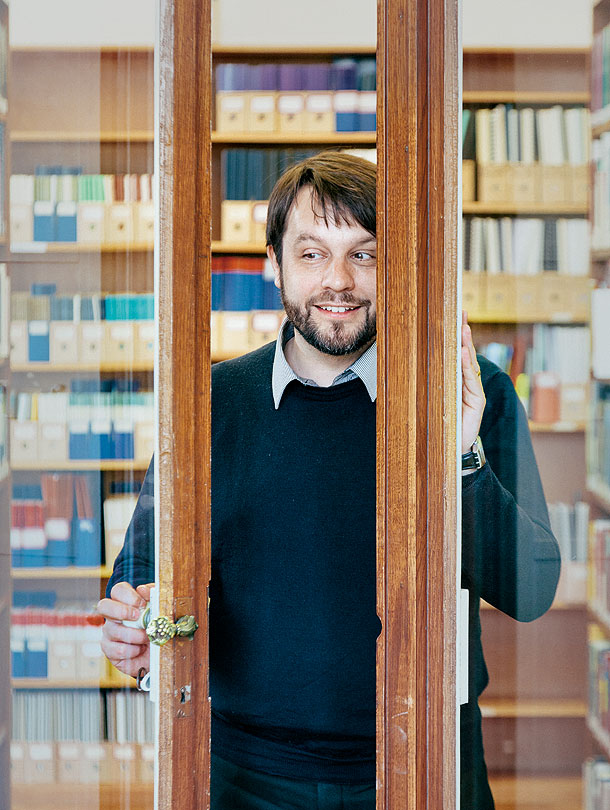Perspectives on Europe and the world at large
Julia Konstantinidis
Ralph Weber likes to cross boundaries. As assistant professor at Basel’s Institute for European Global Studies, his frame of reference is global rather than Swiss or European.
Ralph Weber has been assistant professor of European Global Studies at Basel’s Institute for European Global Studies (EIB) since December 2014. It took him some time to settle into his office, as it is located on the second floor of a villa with grounds in the city’s Gellert quarter. With its antique furniture, walls painted a soft light blue and views of the surrounding stately gardens, Weber’s workplace is the antithesis of the functional atmosphere typically found in academic environments.
However, it is only fitting that the person working in these unlikely surroundings should be Weber, since he, too, has followed his own path in his career. After a doctorate in political science, he then completed his postdoctoral ‘Habilitation’ in comparative philosophy at the University of Zurich’s Faculty of Arts. Among other things, his research focuses on Chinese politics.
Looking beyond Europe
As an undergraduate at St. Gallen, Weber, who has roots in eastern Switzerland, had already dealt with political philosophy, a subdiscipline of political science. Ever since he took a course in Chinese history during his exchange year at Geneva’s Graduate Institute of International and Development Studies, the Far East has held a fascination for him. “Having learned Chinese and gained some experience of doing research on China, I feel able to write with some confidence about the country. That said, I don’t pretend to make any contributions to Chinese studies as such.”
Weber, who is now 40, was almost destined to develop a perspective that reached beyond Europe: “I was born to Swiss parents in South Africa. After I came back to Switzerland, people used to ask me about my native country’s apartheid regime, which led me to take an early interest in non-European politics.” Weber’s main research areas include the study of political philosophy in China, where much of the relevant intellectual discourse is subject to pressure from the country’s Communist Party (CPC). One thing he is interested in is the background behind current local research in the discipline, which is controlled by the CPC: “Certain interpretations of Confucianism and other strands of philosophy do raise questions as to the party’s hidden agenda. In many cases, you’ll find philosophy being used as a means to a political end.” However, he is convinced that China shares some of its concerns with Europe, such as environmental protection or the peaceful coexistence of different religions. In addition, he feels that the dissimilarities between Chinese and European philosophy are often exaggerated.
A professorship with scope for freedom
Weber’s approach, which straddles disciplines as well as cultures, makes him ideal for a role at the EIB, particularly considering the institute’s newly defined focus on European Global Studies. “An interest in Europe requires that you take an interest in the rest of the world,” Weber explains. With titles such as ‘Introduction to Intercultural Philosophy’, ‘Problems in Critiques of Eurocentrism’ and ‘Local Experiments in the People’s Republic of China in the Light of Political Theory’, the courses and seminars he teaches reflect his international outlook. “European Global Studies is still evolving as a focal area, which makes work all the more exciting,” he says. Whenever he talks about his research, his enthusiasm is visible. “This professorship allows me a great deal of freedom,” he adds.
Married with two children, Weber admits that his around-the-clock job can be difficult to reconcile with his private life. Still, he values the opportunity to exchange ideas with colleagues at the institute who work in disciplines such as law or history. Among other things, he says, this helps him avoid becoming overconfident in his work, which he thinks is beneficial: “I find that it helps me grow.”
Ralph Weber
was born in Johannesburg, South Africa, in 1974, and studied Political Science (Politics, Economics and Law) at the University of St. Gallen and Geneva’s Graduate Institute of International and Development Studies. He later had study stays at the University of Hawaii at Manoa and Peking University. Subsequently, he became a research assistant in the Department of Political Science (headed by Professor Roland Kley) at the University of St. Gallen, where he obtained his doctoral degree in 2007. From 2008 to 2014, he was part of the University of Zurich’s University Research Priority Program (URPP) Asia and Europe, working, among other things, on a postdoctoral ‘Habilitation’ thesis on comparative philosophy. Since December 2014, he has been an assistant professor of European Global Studies at the University of Basel’s Institute for European Global Studies.

